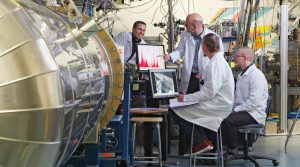RADIATE aims to provide easy, flexible and efficient access to researchers from academia and industry to European ion beam facilities. Over the course of the project’s run-time, more than 15.800 hours of transnational access (TA) will be offered by 14 RADIATE’s project partners. First statistics on transnational access are published here.
Through transnational access, RADIATE is able to offer a wide range of ion beams of all stable elements in the periodic table from low to high ion energies. RADIATE unifies diverse but complementary facilities across Europe and creates a coherent network.
RADIATE will diversify, widen, and deepen transnational access. The main objective is to enlarge the community of ion beam technologies to users from new disciplines and new industries. The aim is to have a sustainable increase in new users by the end of the project. RADIATE will do so by catering to the specific needs of new, first time users and offer sample preparation, characterization, quality assurance, clean room, and sample storage, amongst other things.
RADIATE transnational access procedure
In order to be granted transnational access, you will have to submit a proposal to RADIATE’s proposal submission system, RADIATE GATE. The maximum number of hours per proposal is 80. Variations in the number of hours are possible in individual cases.
For now, the project partners have agreed on a continuous application procedure. This might change in case application numbers are too high. Once the proposal was submitted, the transnational access manager checks your proposal for eligibility, sanity, and feasibility. The TA manager then sends it to an external user selection panel for evaluation.
If your proposal is accepted by the user selection panel, you will be allocated beam time at an ion beam infrastructure abroad in a different European country as RADIATE encourages transnational access. It is not possible to receive beam time in your own country. Your proposal will be assigned to an appropriate ion beam center based on the existing complementary expertise and experimental setups.
It is also possible to apply for hands-off access to an ion beam infrastructure. In this case, you will send your samples to the assigned ion beam facility and the local TA contact will measure your samples for you.
Access is granted free of charge to positively evaluated proposals as long as the allocated hours are not used up. Travel costs are reimbursed to a certain extent.
Who is eligible for RADIATE transnational access?

RADIATE’s main target group are users working in EU member states and associated states. As the main objective is to open ion beam facilities to new users and to users from new disciplines and industries, these applicants will be favored in the allocation of beam time if the proposal is accepted by the user selection panel.
A user group is only eligible for beam time in a different country than the country of employment, i.e. a French group or company cannot be granted access to a French facility under RADIATE.
According to Article 16.1 of the Horizon 2020 Grant Agreement, up to 20% of the total amount of access units may be distributed to user groups with a majority of users not working in a EU or associated country, i.e. third countries.
Grants are not solely given to scientists working at research institutes, but also welcomes applications from industry. However, to be granted beam time, the RADIATE user selection panel has to assess the proposal. Your proposal will, of course, be handled confidentially.
Why apply for RADIATE transnational access?
- Work with some of Europe’s leading scientists in the field of ion beam physics
- Be part of the European ion beam community
- First time users receive extensive training and support from proposal submission to experiment analysis after the transnational access
- Access is granted free of charge for a maximum of 80 hours per proposal
- Travel costs and accommodation are covered by the project